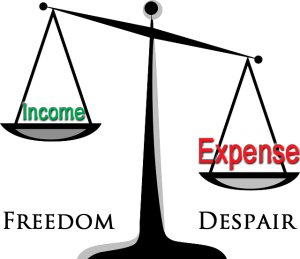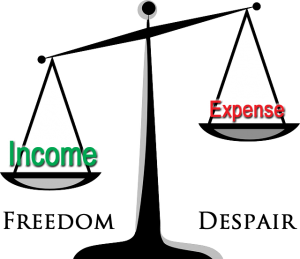From George Papadopoulos’ WSJ Blog we see the unique perspective of a dual U.S.-Greek citizen with family in Greece who he visits almost every year. On recent visits, he has experienced firsthand the hardships the Greek people are living with because of that country’s failure to follow basic financial management principles. We can learn from the Greek crisis and avoid a similar fate by applying these 7 personal finance lessons:
Don’t spend more than you can afford
So basic yet so hard for many of us to grasp–you can’t spend what you don’t have. At least not for long. Our grandparents and great-grandparents knew this. Somehow, the current generations seem to have forgotten this simple equation:
Income – Expense = State of Mind
If you want freedom and security as your state of mind, then Expense must be less that Income. If you spend more than you have, your state of mind will be fear and despair as we are seeing in the Greek crisis (long lines at ATMs, government imposed restrictions on how much money you can retrieve from your bank, etc.). True financial freedom requires that we plan and manage our finances so that what we owe never exceeds what we have. Mr. Papadopoulos calls this “Personal Finance 101” and the golden rule to follow if you want to avoid bankruptcy.
But how?, you ask. Simple–earn more or spend less. Get more education, learn valuable skills, get a better job, sell off assets.
Increasing income, relative to debt, tilts the life balance toward Freedom and happiness. This is the essence of abundant living. Living within our means brings peace and security.
Sadly, it’s on the other side of the balance where Greece ended up and where many families and individuals in America are.
 Don’t be crushed by a heavy burden of debt. Which leads us to number 2….
Don’t be crushed by a heavy burden of debt. Which leads us to number 2….
Avoid debt
Face it. None of us likes to hear this. Especially when we have loads of debt. But, there is a way to get out of debt and stay out. It isn’t easy but it is doable and you should start working your way out of debt today. Greece’s continual borrowing and putting off the inevitable repayment eventually crushed it’s country’s currency and economy. For you and me, that means, pay off credit cards and consumer debt now. Don’t worry about paying off your mortgage yet. Get the big interest consumer debt off your back first. Then, if you can then pay down your mortgage by the time you retire, you’ll be fine.
Make a Plan and Stick to it
Set some goals. Write them down. Remember, a goal unwritten is merely a wish. You have the power to create a better future by planning and living according to the plan. Greece is paying a terrible price now for not having a plan–their lack of a plan led to continual borrowing with no way to repay. The day of reckoning came and crushed the Greek economy.
Get out a pencil and paper or fire up Excel and start listing your income and expenses. See our article on setting up a spending plan for details. Once you have a plan, live it. But don’t expect everything to go perfectly according to your plan…
Always have a Plan B
What you really want are options. Think of it as a Plan B, Plan C, Plan D, etc. When you are being crushed under a mountain of debt, you have few options. When you have money to spare, you have all the options in the world. The point here is that YOU should be in control, not your creditors. Greece has no options but to accept the terms their creditors are requiring. This has caused unrest and a change in government. Point taken?
Do not burn bridges
Take the time to improve your relationship with your landlord, your bank and your other creditors. Be the best employee you can be and bring your positive attitude with you into your workplace. You need security in your job if you are to create options for yourself. Likewise, avoiding creditors will get you on their naughty list very quickly. If you’re behind on a bill, call the creditor and tell them you want to get caught up and work with them to get better terms. Be cheerful and stay positive. For you to be free, the piper must be paid.
Actions have consequences
I used to work in a bank where I served many customers. One in particular drove expensive cars, lived in an enormous home and took extravagant vacations. He was a doctor and had a huge income so you would think he had it made. The truth was he owed money to dozens of creditors, all of whom were anxious to be repaid. He had a terrible credit score and had gone bankrupt several times. Worse, as he neared retirement age, he and his wife had no ability to slow down and take life easy because they had huge bills to pay. In summary, they had no options.
In contrast, I remember a low income customer. She worked for the power company taking payments and answering calls. Apart from being the only wage earner in her home, she cared for a sick husband and raised her daughter by herself. She kept track of every penny that came in and made sure that she was just as careful with every penny that went out. Having lived humbly her whole life, when retirement came (her sick husband had passed by this time), she had options for her later years. In her retirement, she traveled the world, took up painting and enjoyed being free to do as she pleased. At her passing, her family was surprised to learn that during her life she had saved hundreds of thousands of dollars in CDs and savings accounts. All with an income that never much exceeded minimum wage. She had made it a priority to control her money and not let it control her.
Change is hard, but necessary
Don’t put off tough decisions or necessary changes. If your job sucks, get a different one. If you’re spending too much, cut back. Today. As a country, Greece is having a rough time making changes. No real reforms are taking place. They are working on a new bailout. Don’t be like that. Take charge, live with purpose and above all, create options!




